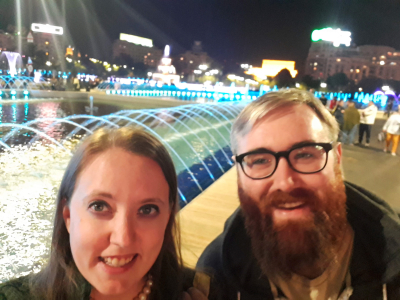Jessica is an independent contractor in the education field. She spends her free time getting to know Romania through food. Together with her husband, MJ, she spends every weekend learning to pickle, preserve and cook meals with traditional Romanian ingredients.
Read more about expat life in Romania in our Expat Arrivals Romania country guide.
About Jessica
Q: Where are you originally from?
A: I’m originally from a small town in Wisconsin, USA.
Q: Where are you currently living?
A: I’m currently living in Bucharest, Romania.
Q: When did you move here?
A: I moved here in February 2017.
Q: Is this your first expat experience?
A: No, I lived in South Korea for four years before coming to Romania
Q: Did you move here alone or with a spouse/family?
A: I moved here with my husband, MJ.
Q: Why did you move? What do you do?
A: After spending four years teaching in South Korea and getting married, my husband and I decided to move somewhere with a better work-life balance. We also wanted to be a bit closer to family. (And honestly, Asia was great, but I missed cheese.)
Living in Bucharest
Q: What do you enjoy most about Bucharest? How would you rate the quality of life compared to your home country?
A: There are so many things to do in Bucharest! Most weekends, and even a lot of weekdays, we struggle to choose something to do. This weekend, for example, there is a craft beer festival, a pumpkin carving contest, a visiting Polish band, and a 5km run. During the summer, we attended festivals, saw midnight art exhibitions, danced at roof parties and went kayaking outside of the city.
At home, I wouldn’t be able to participate in as many fun things because I’d have less time and fewer transportation options. Also, the weather here is so much better. I’m from a very cold place with long winters, and I love the really long warm seasons here in Romania.
Q: Any negative experiences? What do you miss most about home?
A: Public services don’t really function efficiently. I have really had to adjust to systems not operating as expected. This is especially true for the postal service. I received a package 10 months late. Sometimes things don’t arrive at all.
I miss a more diverse food scene. Romania has a lot less restaurant diversity than other European capitals. Things are changing with a thriving food truck scene, but unfortunately, they aren’t available in the winter, so dining options aren’t great for half of the year.
Q: What are the biggest adjustments you had to make when settling into expat life here? Did you experience any particular elements of culture shock?
A: After living in an expat community where most people worked similar jobs, had similar schedules and stayed around for at least a year, it was difficult to adjust to an expat community of digital nomads, people visiting on short-term contracts and a lot of international students. It was also really difficult to adjust to people not standing in lines – in the bank, at the airport and so forth.
Q: Would you say that Bucharest is a good city for people with dietary restrictions? Have you had any experiences with living on a restricted diet here?
A: Bucharest can be a frustrating place to be a vegetarian/vegan. There are a few restaurants that cater to vegetarians, but in general, it can be difficult to get a real meal when dining out. This has been changing over the years since I’ve arrived, but it’s still easiest to cook at home. There are also more limited options in terms of ready-made vegetarian options (like frozen veggie burger patties) in the freezer section.
Q: What’s the cost of living compared to home? Is there anything particularly expensive or particularly cheap in Romania?
A: The cost of living in Bucharest is much lower than in America. However, housing costs are increasing really quickly. A lot of central apartments are being turned into Airbnb-type rentals, driving up the cost of housing. Transportation costs are much lower than in both America and Korea. Part of the reason that I decided to stay in Romania is that it’s only a few dollars to take a car service or taxi from the city center to the airport. This really opens up a lot of discount travel options.
Q: How would you rate the public transport in Bucharest?
A: Traffic is really bad during rush hour in Bucharest. I’m so thankful to live near a metro line. There are only a handful of lines, but they connect the parts of the city we most often visit. There are also streetcar and bus services, but those tend to be much slower. They are also more difficult to navigate as a newcomer. Romanians really hate drafts, so even in the sweltering heat of summer, they will not open the windows on the train cars. It can be a really hot, sweaty, uncomfortable experience.
Q: How would you rate the healthcare in Bucharest? Have you had any particularly good/bad experiences with regard to doctors and hospitals?
A: Since I’m American, healthcare just about everywhere is better than my healthcare at home. I have only had one experience with the healthcare system so far, and everything was really convenient. I chose to use the private healthcare network. I used a website that compiles all of the hospitals and clinics (both public and private). You can search by what service is needed and get a list of all of the specific places that did what I needed.
The appointment was so easy to make. I’m used to waiting for a long time, especially to see a specialist, but I had the option of scheduling an appointment for the next day. I do have health insurance, but in this case, it was easier, faster and more convenient for me than waiting for an appointment in the public network.
Q: What are the biggest safety issues facing expats living in Bucharest or Romania? Are there any areas expats should avoid?
A: I’ve always felt very safe in Romania. I think the biggest danger is driving/cycling. There are very few highways throughout Romania. This means two-lane roads through dangerous mountains. We took a road trip across the country during the summer, and I was terrified the whole time. We also saw numerous incredibly serious accidents. Within the city, there are also a lot of driving dangers. There are almost no dedicated cycling lanes, so commuting by bicycle can also be quite dangerous.
Q: How do you rate the standard of housing in the city? What different options are available for expats?
A: I recommend using a realtor. There are so many considerations to take into account when finding an apartment in Bucharest. Many apartments are in big communist-style blocks. However, there are a lot of smaller buildings with more unique layouts. These smaller buildings can be in varying states of repair. If you move to the northern edge of the city, there are modern, compound-style buildings.
Bucharest is a very seismically active place. So it’s really important to check the earthquake rating of the building before agreeing to a lease. Additionally, some buildings have not been rated properly and require an on-site inspection for cracks in foundations and so forth. Again, this is where it is useful to work with a professional who is familiar with different properties in the area.
Q: Any areas or suburbs you’d recommend for expats to live in?
A: I recommend staying as near to work or a metro line as possible. As I mentioned, traffic is really bad here, and commuting can take hours if you live even a few miles from your job. Other than that, there are lots of shopping malls, cinemas and large public parks scattered throughout the city that make many different neighborhoods appealing.
Meeting people and making friends
Q: Was meeting people and making friends easy? How did you go about meeting new people?
A: With all of the events and things to do, it’s really easy to meet new people. We are often approached by Romanians or other foreigners whenever we attend a festival, art event, sporting event, etc. There is a very active Facebook group for expats, and people are meeting up for things all the time. There are plenty of language exchanges, trivia nights, InterNations events and other similar events you’d expect in an expat community.
Q: Have you made friends with locals or do you mix mainly with other expats? What advice would you give to new expats looking to make friends with the locals?
A: Many young Romanians speak English, so it was a lot easier to interact with locals right away than it was in South Korea. We made a lot of expat and local friends playing Pokémon Go. I would advise people to seek out groups doing the activities they enjoy. Almost everyone uses Facebook events to plan meetups. It’s easy to meet people with all kinds of interests.
Working in Bucharest
Q: Was getting a work permit or visa a relatively easy process? Did you tackle the visa process yourself, or did you enlist the services of an immigration consultant?
A: We tackled the visa process ourselves, but if I got to do it over again, I would use a professional. The process is lengthy and complex. We started the process in March, and I didn’t receive my residency card until November. There were countless trips to the immigration office where we received confusing and often contradictory instructions from the staff.
Q: What is the economic climate in the city like? Do you have any tips for expats looking to find a job? Which resources did you find most useful?
A: There are a lot of jobs available at international companies, especially in the IT field. It is not necessary to know Romanian for some positions at the big multinational companies. Knowing a second European language is a plus. Companies tend to recruit on LinkedIn. There are also often jobs posted in the expat Facebook groups.
Final thoughts
Q: Is there any advice you would like to offer new expat arrivals to Bucharest or Romania?
A: The visa work and housing search can be daunting, but ask for help from a professional instead of stressing out. Romanians are really friendly and helpful, and it’s easy to find assistance when you need it. The mountain of paperwork was the most difficult part of my experience so far in Romania, but it was absolutely worth it for the lifestyle I get to enjoy now.
► Interviewed October 2019



